Your dog's vomiting after drinking water can have several causes. Common reasons include drinking too quickly, swallowing air, contaminated water, or underlying health issues like megaesophagus. To address this, try using slow-feed water bowls, monitoring water intake, and ensuring clean water sources. If vomiting persists, withhold water for 30 minutes, then reintroduce it gradually. Watch for additional symptoms like lethargy or loss of appetite, which may indicate more serious problems. For frequent or severe cases, consult your veterinarian. They can help identify underlying issues and provide tailored solutions. Understanding the root cause is key to preventing future episodes and ensuring your pup's health.
Common Causes of Water-Induced Vomiting
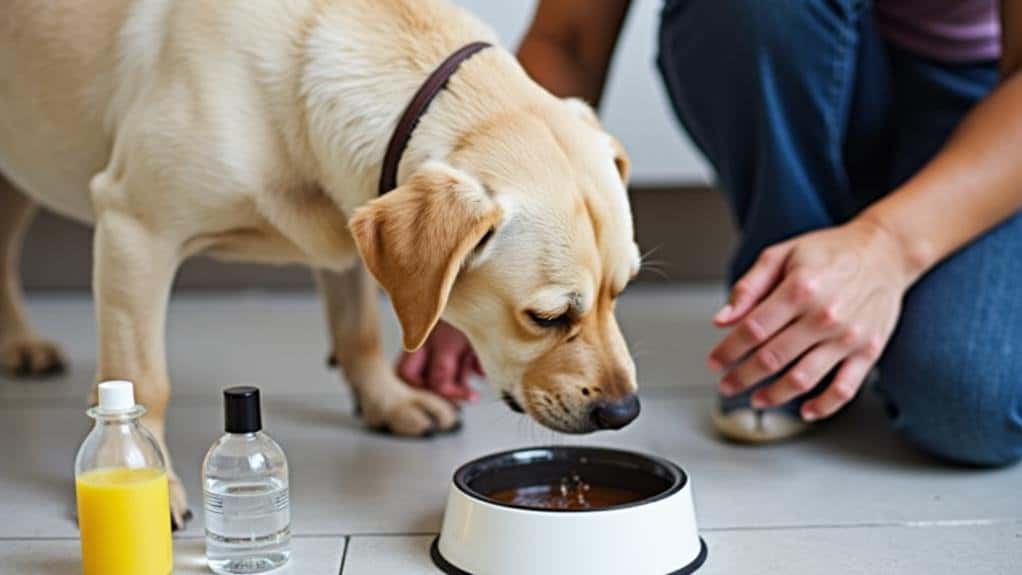
As a dog owner, you might be alarmed to see your furry friend vomit after drinking water. Understanding the common reasons why dogs experience this issue can help you address the problem effectively.
One of the most frequent causes is rapid intake, especially after exercise. When dogs drink too quickly, they may swallow excessive air, leading to discomfort and vomiting.
Contaminated water sources, such as stagnant ponds or dirty bowls, can introduce harmful bacteria or parasites, causing gastrointestinal upset and subsequent vomiting.
Certain health issues can also contribute to vomiting after drinking water. Megaesophagus, a condition where the esophagus fails to contract properly, can prevent normal swallowing and result in regurgitation.
Additionally, stress or excitement can trigger nausea in dogs, causing them to vomit in high-energy situations.
Excessive water consumption is another concern. Water intoxication, though rare, can occur when dogs drink too much water too quickly, leading to electrolyte imbalances and vomiting.
It's crucial to monitor your dog's drinking habits and provide fresh, clean water in appropriate amounts to prevent these issues.
Recognizing Symptoms and Warning Signs
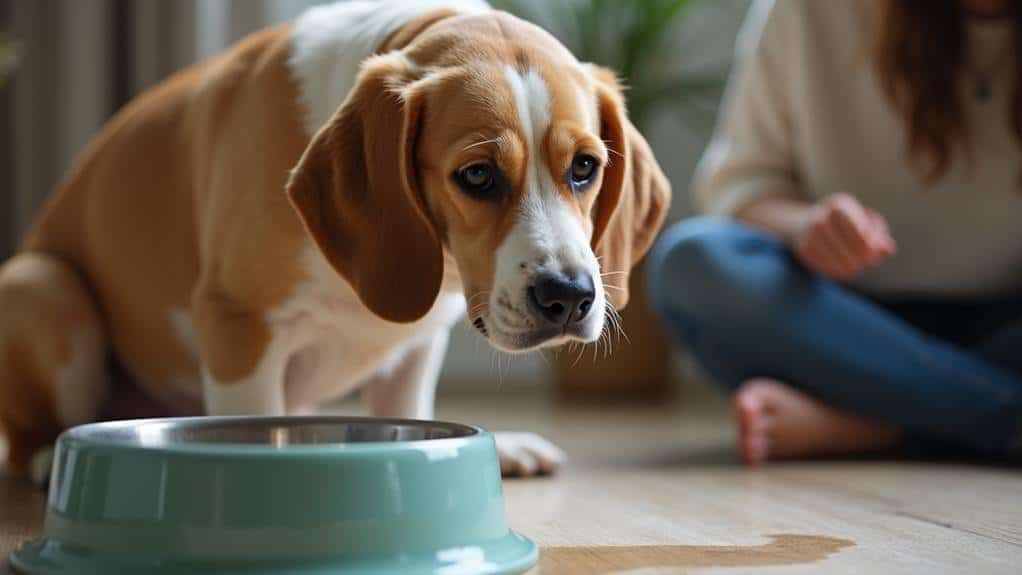
Recognizing the symptoms and warning signs of water-induced vomiting in dogs is essential for timely intervention. Monitor the frequency of vomiting episodes after your dog drinks fresh water. While occasional vomiting mightn't be alarming, frequent occurrences could indicate underlying health issues.
Pay close attention to the color and consistency of your dog's vomit. Unusual colors or the presence of blood may signal serious digestive system problems requiring immediate veterinary attention.
Look for additional symptoms such as lethargy, loss of appetite, abdominal swelling, or sensitivity, as these could suggest a more severe condition. Be aware of excessive thirst paired with low appetite alongside vomiting, as this combination might indicate laryngeal paralysis or other serious health concerns.
Document any behavioral changes, like restlessness or hiding, which can be signs of discomfort or distress.
Immediate Steps to Take
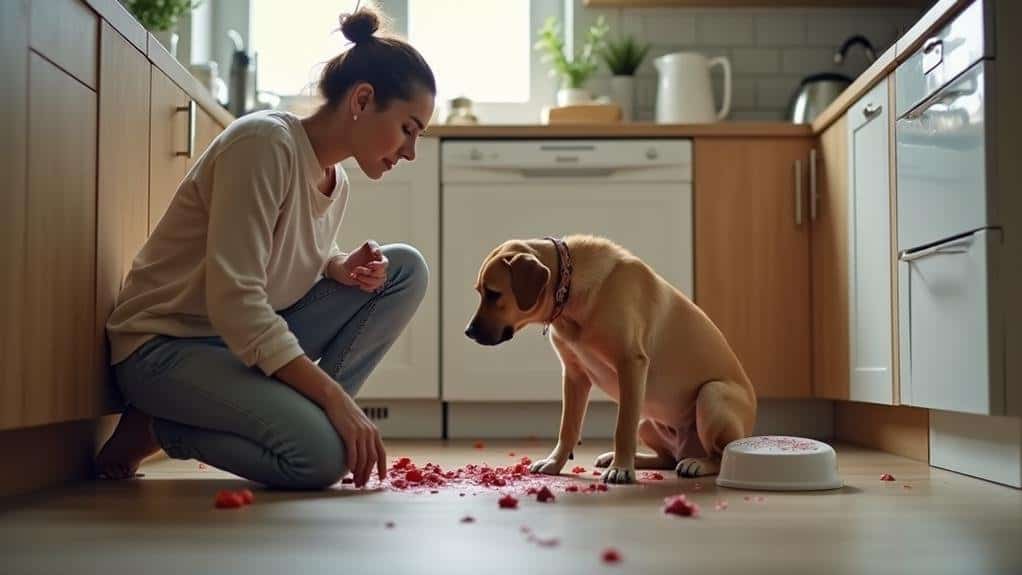
When your dog vomits after drinking water, quick action is vital. Your first step should be to withhold water for about 30 minutes, allowing your pet's stomach to settle.
After this brief pause, gradually reintroduce small amounts of water. Avoid feeding your dog until the vomiting subsides, as food can exacerbate the issue.
Observe and document the frequency and conditions of your dog throwing up after drinking. This information will be valuable if you need to consult a veterinarian.
Keep a close eye out for additional symptoms, such as:
- Lethargy or unusual behavior
- Changes in appetite or eating habits
- Signs of dehydration, like dry gums or sunken eyes
- Persistent or worsening vomiting
If vomiting persists or you notice any of these signs, it's important to seek immediate veterinary attention.
Your vet may need to perform a thorough examination and diagnostic tests to identify any underlying serious health concerns.
Long-Term Prevention Strategies
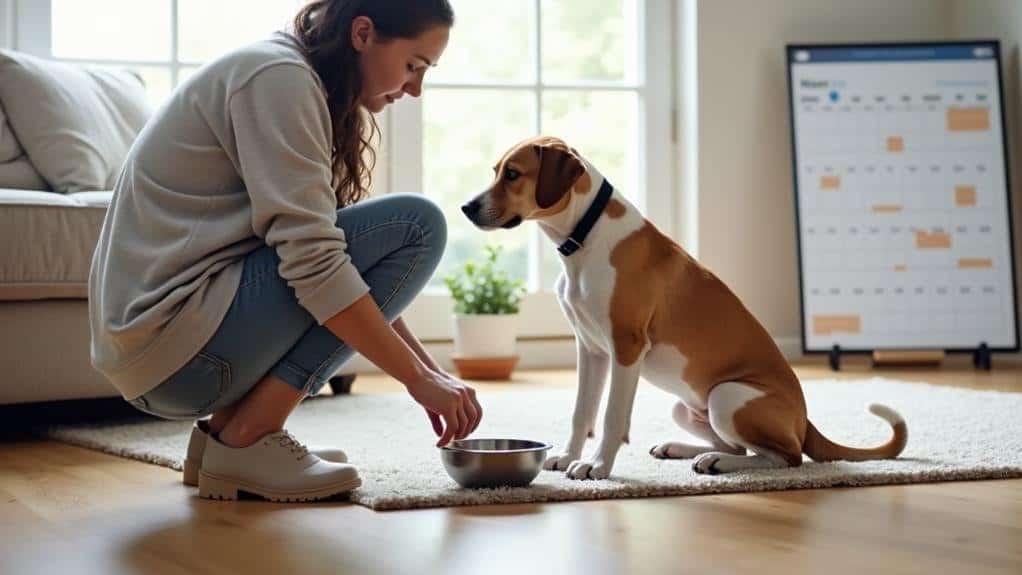
To keep your dog from vomiting after drinking water in the long run, you'll need to implement some sustainable strategies.
Start by investing in slow-feed water bowls designed to encourage gradual consumption and reduce gulping. These specialized bowls can help regulate your dog's water intake, minimizing the risk of vomiting.
Maintain a clean water bowl and provide fresh water regularly to prevent bacterial growth and contamination.
Monitor your dog's drinking habits, especially after exercise or in hot weather, to avoid overwhelming their stomach. You can introduce ice cubes or frozen treats to make water more appealing and encourage slower drinking.
Consult your veterinarian for dietary adjustments and regular health check-ups to address any underlying issues that may contribute to vomiting after drinking water.
Your vet can help identify potential causes, such as excessive drooling or digestive problems, and recommend appropriate long-term prevention strategies.
When to Consult a Veterinarian
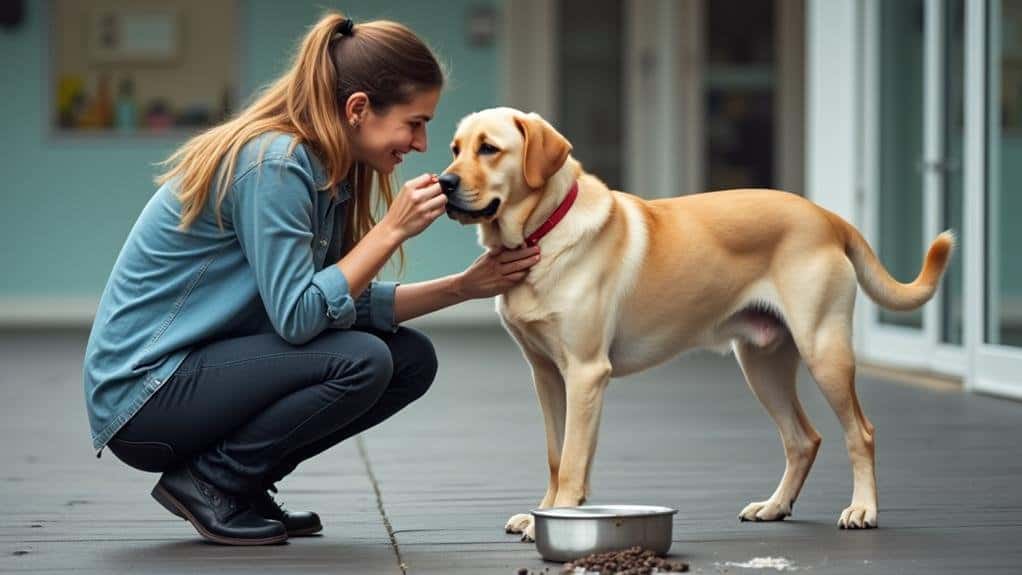
The decision to consult a veterinarian about your dog's water-induced vomiting shouldn't be taken lightly. If your furry friend experiences persistent vomiting after drinking water for more than 24 hours, it's essential to seek medical attention. This symptom could indicate serious underlying health issues that require professional evaluation.
Be vigilant for accompanying symptoms that warrant immediate veterinary care:
- Diarrhea or severe lethargy
- Signs of dehydration, such as dry gums or sunken eyes
- Sudden changes in behavior or eating habits
- Distress symptoms like excessive drooling or abdominal swelling
These signs could point to potentially life-threatening conditions like bloat or gastrointestinal blockages. Don't hesitate to contact your vet if you notice any of these symptoms alongside vomiting.
To help your veterinarian diagnose the issue effectively, keep a record of your dog's vomiting episodes. Note the frequency, timing, and any circumstances surrounding each incident. This information can provide valuable insights into the underlying cause of your dog's distress and guide the appropriate treatment plan.
Managing Hydration Safely
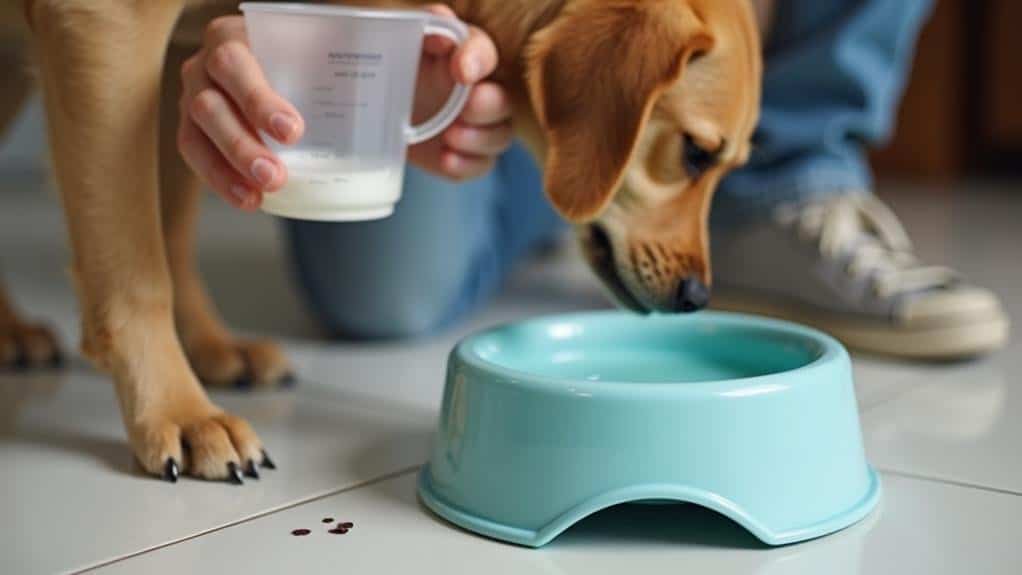
A balancing act awaits dog owners when it comes to managing their pet's hydration safely. To prevent vomiting after drinking water, you'll need to take a strategic approach to your dog's water intake.
Start by offering small amounts of water during and after exercise. This prevents overwhelming your dog's stomach and reduces the risk of vomiting. Invest in slow-drinking bowls to encourage controlled sipping, which minimizes excessive air intake and stomach distension.
Maintain cleanliness by regularly changing and cleaning your dog's water bowl. Fresh, clean water is essential for preventing contamination that could lead to vomiting.
When you're out for walks, gradually fill the water bowl to discourage rapid consumption and promote frequent, smaller intakes.
Keep a close eye on your dog's drinking habits, especially in hot weather. Adjust water quantities as needed to guarantee they stay hydrated without overdrinking.
Frequently Asked Questions
How Do I Stop My Dog From Throwing up After Drinking Water?
To stop your dog from throwing up after drinking water, use specialized slow-drinking bowls, limit water intake, offer fresh water regularly, and provide ice cubes during walks. Monitor consumption and consult your vet if vomiting persists.
Why Does My Dog Drink so Much Water and Then Throw Up?
Your dog may be drinking excessively due to thirst, exercise, or hot weather. They're likely gulping too much, too fast. This can overwhelm their stomach, leading to vomiting. Stress or excitement can also cause rapid drinking and subsequent vomiting.
What Do You Give a Dog for Vomiting?
You can give your dog Pepsid (Famotidine) to help with vomiting. Mix it with food for easier consumption. Always consult your vet for the correct dosage. If vomiting persists for more than four days, seek veterinary care immediately.
What to Do if Your Dog Throws up Clear Mucus After Drinking Water?
If your dog throws up clear mucus after drinking water, withhold food and water for a few hours. Gradually reintroduce small amounts of water. Monitor for additional symptoms. If vomiting persists beyond 24 hours, consult your veterinarian.
Conclusion
You've learned why your dog might throw up after drinking water and how to address this issue. Remember to monitor your pup's drinking habits, implement preventive measures, and seek veterinary care when necessary. By staying vigilant and taking appropriate action, you'll help guarantee your furry friend stays properly hydrated without discomfort. Don't hesitate to consult your vet if you're unsure or if symptoms persist. Your dog's health and comfort are worth the effort!

